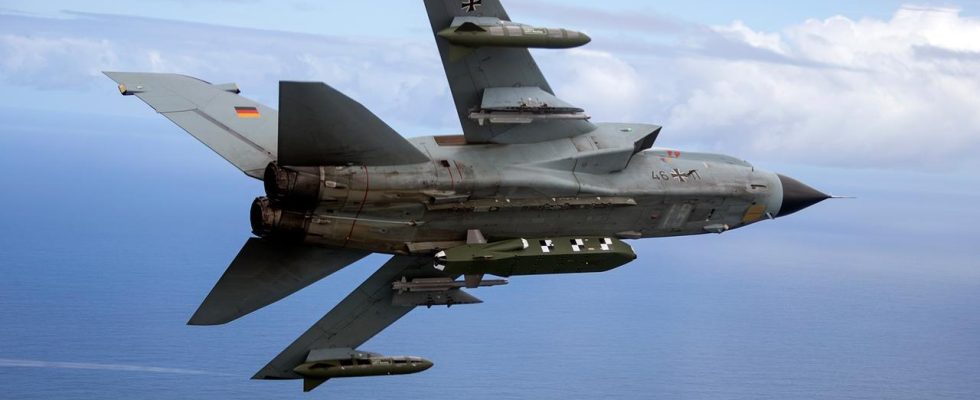context
The intercepted conversation of the Bundeswehr officers is seen by Russia and pro-Russian actors as evidence of the West’s direct involvement in the war. Experts disagree – and see propaganda at work.
Kremlin spokesman Dmitri Peskov sees the intercepted conversations of Bundeswehr officers as evidence of the West’s “direct involvement” in the war in Ukraine. The Russian state broadcaster RT DE even writes about a “terrorist attack with German “Taurus” cruise missiles on the Crimean Bridge” that the officers had planned. And the deputy chairman of the Russian Security Council, Dmitry Medvedev, warns on his Telegram channel that “Germany is preparing for war with Russia.”
The content of the conversation is perceived as significantly less explosive in Germany. Defense Minister Boris Pistorius, for example, said that the majority of the content of the conversation had already been publicly known.
Not a belligerent within the meaning of international law
Rafael Loss, coordinator for pan-European data projects at the European Council On Foreign Affairs (ECFR), also confirms this. Basically, the federal government is supporting “Ukraine’s right to self-defense, which is guaranteed under international law” through arms deliveries. “This does not make Germany a party to war in the sense of international law,” says Loss.
Christoph Schwarz, Research Fellow at the Austrian Institute for European and Security Policy (AIES), also sees it that way. “Basically, it should be said that Germany’s participation in the war would only come about through two scenarios: firstly, if German soldiers were to carry out active and direct combat operations or secondly, if the alliance (NATO or EU) were to occur through the expansion of combat operations to an EU – or NATO member state would be triggered.”
This would not be the case through mere arms deliveries or training, even on Ukrainian territory, says Schwarz. Things could get tricky in the context of the “Taurus” rockets if German soldiers were directly involved in the use of these weapons.
“Inappropriate and untrue”
In the leaked conversation, options are discussed on how the delivery of “Taurus” cruise missiles could be accomplished. “If we were to decide politically to support Ukraine, how could the whole thing work out in the end?” asks one participant. But “this does not prejudge a decision by the political leadership, as the participants in the discussion explicitly point out,” explains Loss from the ECFR.
Schwarz from AIES also points out that Ukraine can use the weapon system independently and without the help of German soldiers, which is why the statement that the delivery of “Taurus” would require participation in the war “can be described as inappropriate and untrue.”
In the conversation it is said: “We also know that there are a lot of people with American accents walking around in civilian clothes.” And elsewhere it is said: “The English (…) also have a few people on site.” But according to the experts, this does not necessarily mean that Great Britain, and certainly not NATO, will be formally involved in the war. It depends on “what specific tasks these people are entrusted with,” says Loss. Schwarz adds: “‘A few people on site’ is certainly not enough to conclude that there was involvement in the war, unless the exact circumstances of these activities are known.”
Britain’s Prime Minister disagrees
Ukraine and Great Britain would deny that the activities constituted participation in war in the sense of international law. And: “Even if individual NATO states decide to support Ukraine militarily, this would not automatically result in the entire alliance participating in the war,” said Loss.
At the end of February, Chancellor Olaf Scholz had already indicated that France and Great Britain could participate in the targeting and monitoring of the targeting of the Storm Shadow missiles. British Prime Minister Rishi Sunak then replied that the deployment and target selection process was a matter for the Ukrainian armed forces. Britain has limited staff in the country “to ensure the security of our diplomatic presence and to support the Ukrainian armed forces, including through medical training.”
Historically, there have been various forms of military cooperation in wars, says Loss. “In the context of upgrading measures, the technical training is often taken over by the supplying partner,” explains Loss. For example, “during the Korean War, Soviet pilots on the North Korean side took part in the air war against the United States and its South Korean allies without being declared a warring party by the United States.”
Threat against Germany?
In Russian state media and pro-Russian channels, however, the content of the conversation is being sold as a major scandal. “The intercepted conversation is seen as definitive proof that Russia is at war with NATO,” says Julia Smirnova, senior researcher at the Institute for Strategic Dialogue Germany (ISD). The content is presented in such a distorted manner, as if it were about a planned attack by the Bundeswehr on Crimea.
Pro-Russian actors in Germany also made similar statements. The Thuringian AfD leader Björn Höcke wrote of a clear violation of Article 26 of the Basic Law, which prohibits the preparation of a war of aggression. Höcke goes on to say: “I condemn the plans of these sandbox generals in the strongest possible terms!” According to its own statements, the right-wing extremist party “Free Saxony” filed a criminal complaint against the soldiers involved.
According to Smirnova, the Kremlin’s main goal is to threaten Germany not to supply Taurus cruise missiles to Ukraine. “This operation apparently had the purpose of preventing the delivery of ‘Taurus’,” says Smirnova. It is also about intimidating the German public and warning them again against continuing to help Ukraine.
“Putin has long imagined himself at war with the West”
It is also emphasized that Russia managed to intercept the conversation. “Some (Telegram) channels make fun of the Bundeswehr’s incompetence,” says Smirnova. In addition, the narrative is served that Germany is not a reliable partner for other NATO countries.
From Loss’s point of view, the publication of the conversation primarily serves propaganda purposes. “It shouldn’t surprise us that Russia is listening in on confidential conversations of German decision-makers and is willing to selectively publish them.” This is intended to undermine Germany’s credibility in NATO and disrupt internal cohesion – with the aim of reducing Western support for Ukraine. The whole thing shows one thing above all: “It just makes it clear that Putin has long believed himself to be at war with the West.”


